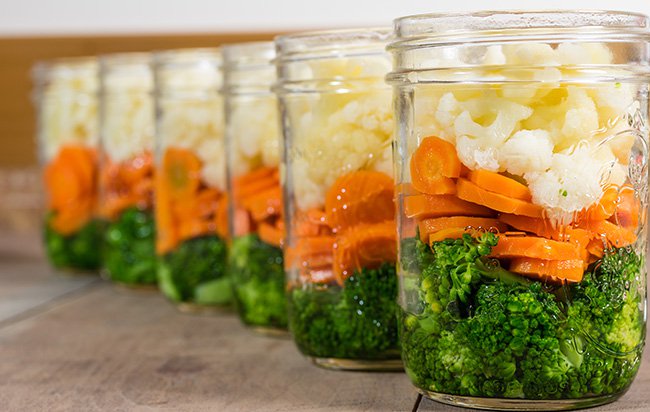
Feel like you are always in a hurry and have to skip meals or reach for the fastest unhealthy foods to get you through the day? Don’t fret, meal prep is here to save you in this time of trouble. Sound like a big chore? Well I have some tricks of the trade to help you go into this with ease and without a long day of cooking and prepping.
Make a List
Before even heading out that door make a list! This is important because sometimes we may go to the store feeling hungry and with no list and end up with a bunch of things that don’t make sense.
List Details:
- Divide into categories: meats, veggies, carbs, dairy, pantry, fats, etc..
- Think about a menu: what meals would you like to rotate throughout your week so you don’t feel bored with the same meals over and over.
Menu Making
- Get a variety of veggies: one thing we all should work on is getting a variety of fruits and veggies. Make a list of different ones that differ in color and tastes.
- Varying your protein sources: not all protein sources are created equal some have different amino acids than others that is why its good to have a variety in the diet.
- Get creative with fresh herbs, seasonings, and marinades.
- Make recipes that vary in cuisine. Example of this is making an Asian dish one day and then a Mexican style dish on another day.
- Mark each day as a certain day like ” Taco Tuesday” this will make it easier to know what to have ready on which day.
Find the Time
- Just like anything else you need to make this a priority and find a day and an allowed time to follow through with your meal prep. This could be every Sunday to start the week off right or it could be just a couple of hours every few days to ensure there is enough food for the days to follow.
Where to start the Cooking
- Start by cooking things that take the longest to cook like meats: chicken, beef, and fish; whole grains like brown rice, farro, or others; dried beans and legumes; roasted veggies in that order.
- Next think of things that should be prepped and ready to add to any meal or can be grabbed easily as a snack. These are things like washed and chopped greens for a salad, cut fruit, hard boiled eggs, and cooked beans.
- If you would rather cook the proteins the day of the meal go ahead and at least have them marinating in a marinade in a big freezer bag.
- Be a multi tasker. While things are cooking in the oven or stove chop veggies and fruits or wash your greens for your salad.
- Finally measure out oats for overnight oats into mason jars and add all ingredients and stick in the refrigerator for the week.
Make Leftovers your Friend
- Make extra portions of these items to use on another day as another meal or for a lunch the next day. You can even freeze that extra meal to use for the next week just be sure to label it accordingly.
- Make use of chopping a variety of veggies like zucchini, yellow squash, broccoli, mushrooms, etc. These can be used raw for salads but also used easily in a stir fry or even added to rice or a sauce.
- Make chicken in a crock pot with several breasts to use in salads, stir fry, tacos, etc.
- Try making your own salad dressing in a big container at the beginning of the week to have on hand for salads throughout the week. A good recipe to use is equal parts vinegar and oil and add in fresh herbs and spices. An example 2 tbsp red wine vinegar, 2 tbsp extra virgin olive oil, a pinch of garlic powder, oregano, basil, salt, and pepper.
Storage
- Choose containers that are air tight. You may want to choose some of different sizes for different item or even those that are meant for single serving plate to be easy to take to work for lunch.
- Most foods can be stored by freezing them to use at a later date to be just as fresh. The only ones to be most weary of are moisture rich items as in salad greens, watermelon, or tomatoes as they tend to become mushy.
- Here are some recommended time frames for cooked foods to be stored bathing the refrigerator or freezer:
Refrigeration at 40 degrees F:
- 1-2 days cooked ground beef or poultry
- 3-4 days cooked whole meats beef, poultry, and fish. Stews and soups.
- 5 days cooked beans and hummus
- A week hardboiled eggs and chopped veggies if stored in an air tight container
- 2 weeks soft cheese opened
- 5-6 weeks hard cheese opened
Freezing at 0 degrees F or lower:
- 2-3 months soups and stews
- 3-6 months cooked or ground meat or poultry
- 6-8 months berries and chopped fruit ( bananas, apples, pears, plums, mango) stored in freezer tight bag
- 8-12 months veggies if blanched first for about 3-5 minutes depending on the vegetable
Last but not least don’t forget to have fun with this. Be creative in your thinking and trying new recipes and foods. Start simply with foods you know well and then little by little start adding in new foods each week.
Healthfully Yours,
Krystal Goodman
Resources:
